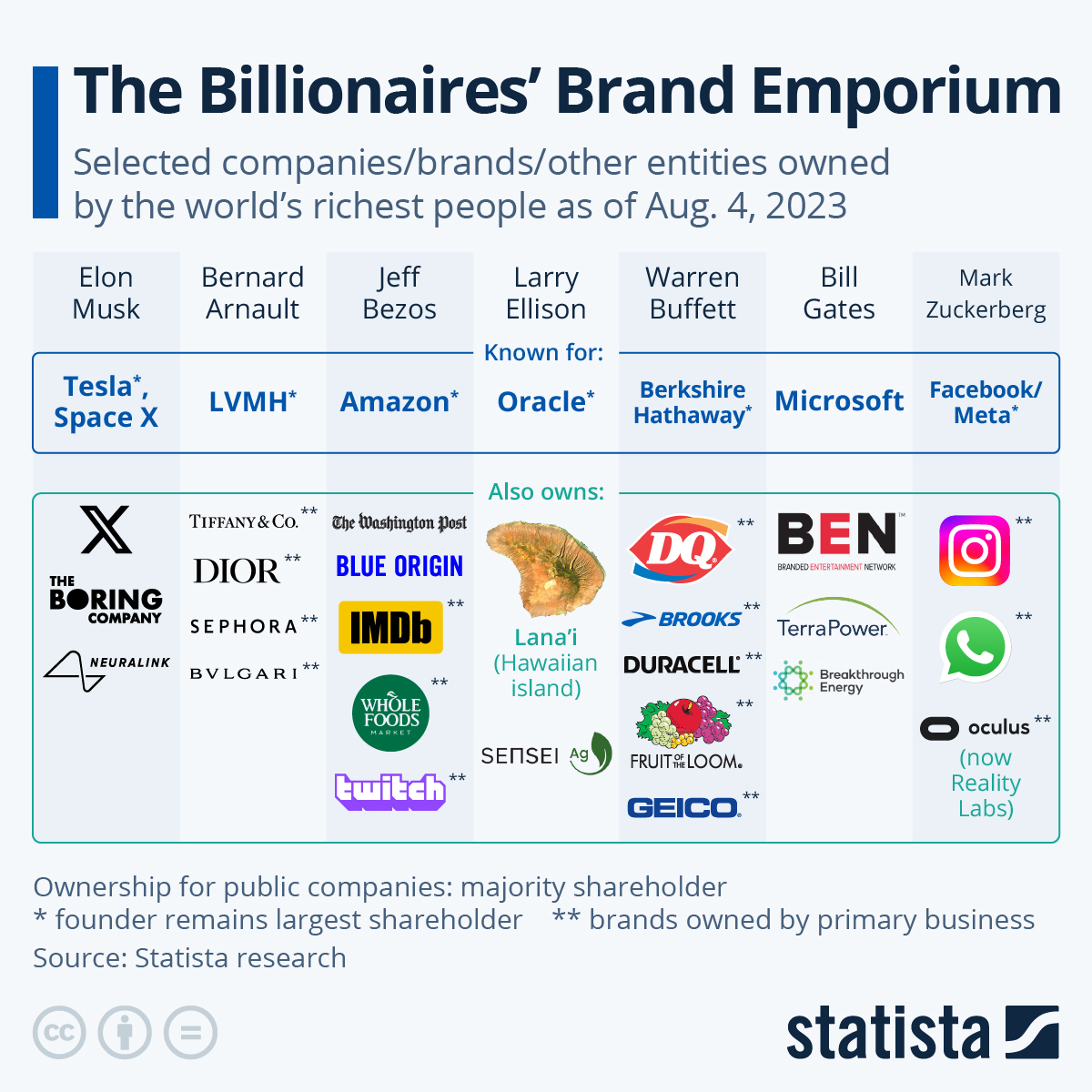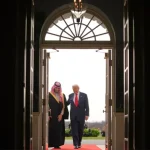
The people who have built some of the world's most successful and influential companies have earned the extra cash that has enabled them to found and acquire - more companies and brands.
However, as Statista's Katharina Buchholz explains below, the world's richest billionaires, including Elon Musk, Bernard Arnault, Jeff Bezos and Bill Gates, have employed different strategies to build their brand emporiums.
While some haven't tired of bringing similar entities under the umbrella of their initial ventures, others have strayed from their paths to explore other industries and endeavors that tickled their business sense or maybe just their fancy.
You will find more infographics at Statista
Amazon founder Jeff Bezos in 2013 did the latter when he bought newspaper The Washington Post. The deal was finalized on Aug. 5 - 10 years ago tomorrow. Bezos had already founded space flight company Blue Origin in 2000. Through his former ownership of Amazon, of which he remains the largest shareholder, Bezos has acquires a sleuth of companies. The takeovers of Audible (in 2008), Twitch (in 2014) and Whole Foods (in 2017) made waves, but it is lesser known that Amazon also owns IMDb (Internet Movie Database - acquired in 1998) and Zappos.com (acquired in 2009).
Elon Musk is another billionaire with a famously varied taste in company founding and acquiring. After his trademark companies Tesla and Space X, already from two different industries, Musk founded The Boring Company in 2016 - introducing his style of less-than-serious business conduct that should later come to define the acquisition of Twitter, now called X. Musk also owns Neuralink Corporation, which is experimenting with brain implants.
Larry Ellison, still the largest shareholder of tech company Oracle, has arguably branched out even more, acquiring 98 percent of the island of Lana'i, Hawaii's sixth-largest, where he now lives. He has also founded Sensei Ag, a company he says is aiming to bring healthy and affordable food to the world through innovative farming techniques.
Bill Gates finally has only retained a 1 percent share in Microsoft and is probably the billionaire who has moved on from his original creation the most. Out of the world's richest people, has founded the most prolific philanthropic venture, The Bill and Melinda Gates Foundation, and has through his newer companies promoted causes like renewable energy.
Among the world's seven richest, Bernard Arnault as well as Warren Buffett and Mark Zuckerberg can be classified as the more steadfast billionaires. Frenchman Arnault, who remains the largest shareholder in luxury conglomerate LVMH, through the entity controls its namesake brands Louis Vuitton, Moët & Chandon and Hennessy as well as Tiffany & Co., Dior, Sephora and Bulgari, among others. Legend has it that as a young engineering graduate, Arnault was stumped that Americans were not familiar with French presidents, but knew French luxury designers like Christian Dior. This allegedly led to him starting the quest of acquiring these brands, including Dior, thanks to his family's construction business fortune.
Warren Buffett and Mark Zuckerberg, also still the largest shareholders in the companies that made them famous, have gone down a similar path. Zuckerberg through Meta (formerly Facebook) has acquired major technology brands like Instagram, WhatsApp and in the course of his foray into virtual reality, VR goggle maker Oculus VR (now restructured as Reality Labs). Buffett through Berkshire Hathaway has amassed a whole list of consumer product companies including Dairy Queen, sports shoe maker Brooks, Duracell, Fruit of the Loom and car insurance company Geico.
The world's richest billionaires - through company stakes - are also connected to each other. While Larry Ellison owns 1.4 percent of Tesla, the largest holding of Bill Gates' foundation is Berkshire Hathaway at almost 20 million shares.
The people who have built some of the world’s most successful and influential companies have earned the extra cash that has enabled them to found and acquire – more companies and brands.
However, as Statista’s Katharina Buchholz explains below, the world’s richest billionaires, including Elon Musk, Bernard Arnault, Jeff Bezos and Bill Gates, have employed different strategies to build their brand emporiums.
While some haven’t tired of bringing similar entities under the umbrella of their initial ventures, others have strayed from their paths to explore other industries and endeavors that tickled their business sense or maybe just their fancy.
You will find more infographics at Statista
Amazon founder Jeff Bezos in 2013 did the latter when he bought newspaper The Washington Post. The deal was finalized on Aug. 5 – 10 years ago tomorrow. Bezos had already founded space flight company Blue Origin in 2000. Through his former ownership of Amazon, of which he remains the largest shareholder, Bezos has acquires a sleuth of companies. The takeovers of Audible (in 2008), Twitch (in 2014) and Whole Foods (in 2017) made waves, but it is lesser known that Amazon also owns IMDb (Internet Movie Database – acquired in 1998) and Zappos.com (acquired in 2009).
Elon Musk is another billionaire with a famously varied taste in company founding and acquiring. After his trademark companies Tesla and Space X, already from two different industries, Musk founded The Boring Company in 2016 – introducing his style of less-than-serious business conduct that should later come to define the acquisition of Twitter, now called X. Musk also owns Neuralink Corporation, which is experimenting with brain implants.
Larry Ellison, still the largest shareholder of tech company Oracle, has arguably branched out even more, acquiring 98 percent of the island of Lana’i, Hawaii’s sixth-largest, where he now lives. He has also founded Sensei Ag, a company he says is aiming to bring healthy and affordable food to the world through innovative farming techniques.
Bill Gates finally has only retained a 1 percent share in Microsoft and is probably the billionaire who has moved on from his original creation the most. Out of the world’s richest people, has founded the most prolific philanthropic venture, The Bill and Melinda Gates Foundation, and has through his newer companies promoted causes like renewable energy.
Among the world’s seven richest, Bernard Arnault as well as Warren Buffett and Mark Zuckerberg can be classified as the more steadfast billionaires. Frenchman Arnault, who remains the largest shareholder in luxury conglomerate LVMH, through the entity controls its namesake brands Louis Vuitton, Moët & Chandon and Hennessy as well as Tiffany & Co., Dior, Sephora and Bulgari, among others. Legend has it that as a young engineering graduate, Arnault was stumped that Americans were not familiar with French presidents, but knew French luxury designers like Christian Dior. This allegedly led to him starting the quest of acquiring these brands, including Dior, thanks to his family’s construction business fortune.
Warren Buffett and Mark Zuckerberg, also still the largest shareholders in the companies that made them famous, have gone down a similar path. Zuckerberg through Meta (formerly Facebook) has acquired major technology brands like Instagram, WhatsApp and in the course of his foray into virtual reality, VR goggle maker Oculus VR (now restructured as Reality Labs). Buffett through Berkshire Hathaway has amassed a whole list of consumer product companies including Dairy Queen, sports shoe maker Brooks, Duracell, Fruit of the Loom and car insurance company Geico.
The world’s richest billionaires – through company stakes – are also connected to each other. While Larry Ellison owns 1.4 percent of Tesla, the largest holding of Bill Gates’ foundation is Berkshire Hathaway at almost 20 million shares.
Loading…






